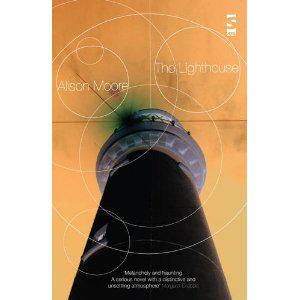 Less than 24 hours ago, an advance copy of The Lighthouse by Alison Moore dropped onto my doormat. I have read it. Writing a review wasn’t on my list of things to do today, but I’m going to do it anyway. I’m itching to discuss this book with someone and unfortunately that will have to wait, because it’s not out until 15 August. The Lighthouse, published by indie publisher Salt, is one of three titles (of 12) on the Man Booker Prize 2012 longlist from small publishers – the others are Swimming Home by Deborah Levy (And Other Stories) and The Garden of Evening Mists by Tan Twan Eng (Myrmidon Books). I think this, along with the fact that a quarter of the titles are debuts, is tremendously exciting. Call it coincidence, but these are also the three titles that most appeal to me and that I want to read regardless of whether they make the shortlist.
Less than 24 hours ago, an advance copy of The Lighthouse by Alison Moore dropped onto my doormat. I have read it. Writing a review wasn’t on my list of things to do today, but I’m going to do it anyway. I’m itching to discuss this book with someone and unfortunately that will have to wait, because it’s not out until 15 August. The Lighthouse, published by indie publisher Salt, is one of three titles (of 12) on the Man Booker Prize 2012 longlist from small publishers – the others are Swimming Home by Deborah Levy (And Other Stories) and The Garden of Evening Mists by Tan Twan Eng (Myrmidon Books). I think this, along with the fact that a quarter of the titles are debuts, is tremendously exciting. Call it coincidence, but these are also the three titles that most appeal to me and that I want to read regardless of whether they make the shortlist.
You’ve probably already guessed that this is a very short book – 180 pages and I estimate around 50,000 words – which puts it at the upper end of novella territory. The novella is an underused form, often dismissed as lacking the substance of a full-length novel, and yet many notable examples have come to assume the status of a novel over time – Heart of Darkness, Of Mice and Men, The Shawshank Redemption. But just as length is no guarantee of quality, brevity is no hindrance to it in the right hands. Last year’s winner of the Booker, Julian Barnes’ The Sense of an Ending was also short, yet widely praised for being complete unto itself, and I think The Lighthouse is that too.
The book tells the story of a middle aged man named Futh, recently separated from his wife, who sets out on a week’s walking holiday in Germany. Don’t come to this for a sense of place though, because it’s not that kind of journey. It is not a good time for him and the mood of the narrative reflects this in painful, claustrophobic intensity. After forging an uncharacteristically meaningful connection with a stranger on the North Sea ferry to Holland, Futh experiences an odd reception (and even stranger departure) at the hotel he has booked for the first and last night of his trip in the town of Hellhaus (which I can’t help thinking was chosen for the way it sounds – although, as explained, it does literally mean ‘light’ and ‘house’, it’s not a translation of the title, which would be Der Leuchtturm, if you really want to know).
The author’s decision to call the protagonist by his unusual (and for many, unpronounceable) surname makes more sense. He lives in the UK but is of American and German origin; we do not know his first name and although we are in his head for much of the story, this adds to the extraordinary sense of detachment that runs right through it, reminding me of Camus’ L’Etranger (The Stranger). Futh is damaged – we find out why - and cannot make head nor tail of his own life. His attachment to the silver lighthouse perfume bottle he associates with the mother he grew up without is like a dependency, acting as a potent symbol throughout, and every bit as dangerous.
Futh’s close third person narrative is spliced with that of Ester, the woman who runs the hotel. I wondered about this at times but it was done for good reason. Anyone who hopes for empathetic characters may struggle with this book; despite moments of huge poignancy in Futh’s life, where the author segues back and forth between the present and the past with great skill, overall I found him difficult to relate to even though ‘likeable characters’ are not that important to me. Yet short episodes reveal much – Futh’s behavior on his wedding night; Ester’s incessant baiting of her volatile husband Bernard at the hotel.
Ultimately,what drew me into this bleak tale of sorrow and abandonment was the quality of the writing – so taut and economical it even looked different on the page somehow – and so effective in creating a mounting sense of menace and unease. It never flinches:
His hand goes to his pocket, seeking out and wrapping itself around the silver lighthouse. He says, going back to English, ‘You wear the same perfume as my wife’. [The woman] looks up, and her gaze drops down to his trousers, to the hand which is deep inside his pocket, gripping the silver lighthouse, his thumb anxiously circling its smooth, warm dome.
For such a small volume, The Lighthouse actually has a deceptively clever structure which I didn’t fully appreciate until the ending, and what an ending it is. I had to think about it, and I like that.

